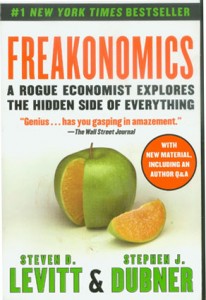| << Back |
In Review: Freakonomics: A Rogue Economist Explores the Hidden Side of Everything
By Steven D. Levitt & Stephen J. Dubner
As reviewed by Macy Walsh
What exactly is a “rogue economist”? One who has stopped taking calls from his CIA handler or wears a disguise when he sneaks into the library to crunch numbers? The rogue, in this case, is Steven D. Levitt, whose chosen field is behavioral economics, which attempts to combine the pure-logic tools of classical economics with an understanding of the emotional impulses of human behavior. He is also a chaired professor of economics at the University of Chicago and the most recent winner of the American Economics Association’s John Bates Clark Medal, awarded biennially to the top economist under the age of 40. He is regarded by his peers as one of the most creative thinkers in his field, gifted at drawing connections between seemingly unrelated forces. Doesn’t sound very “rogue” to me.
If there is a theme to Freakonomics, it’s the re-thinking of conventional wisdom, which, it turns out, may not be as wise as we think. Among the many questions the book explores are such things as: What do school teachers and sumo wrestlers have in common? How is the Ku Klux Klan like a group of real-estate agents? What do online daters lie about? What makes a perfect parent? What were your parents telling the world when they gave you your name? And the one for which he is best known: Where have all the criminals gone?
Levitt’s conclusion, which managed to offend nearly everyone, is that abortion curbs crime. What he claims, specifically, is that the sharp drop in the United States’ crime rate during the 1990s–commonly attributed to factors like better policing, stiffer gun laws and an aging population–was in fact largely due to the Roe v. Wade decision two decades earlier. The logic was simple: unwanted children are more likely to grow up to become criminals; legalized abortion leads to less unwantedness; therefore, abortion leads to less crime. Conservatives were outraged that abortion was seemingly being promoted as a solution to crime. Liberals detected a whiff of racist eugenics. Besides, what business did this callow economist have trespassing on the territory of the criminologist? Economics is supposed to be about price elasticities and interest rates and diminishing marginal utilities, not abortion and crime. That’s what makes it so useful to undergraduates fighting insomnia.
Levitt has strayed far from the musty halls of the dismal science in search of interesting problems. How do parents of different races and classes choose names for their children? What sort of contestants on the TV show “The Weakest Link” are most likely to be discriminated against by their fellow contestants? If crack dealers make so much money, why do they live with their mothers? Such everyday riddles are fair game for the economist, he contends, because their solution involves understanding how people react to incentives. The trivia alone is worth the cover price. Did you know that Ku Klux Klan members affixed a “kl” to many words, and thus, two Klansmen would hold a “klonversation” in a local “klavern”, or that their secret handshake was “a left-handed, limp-wristed fish wiggle”? Levitt uses the rise and fall of the K.K.K. to illustrate the power of hoarded information. He finds a parallel in the world of real estate where brokers employ code words in advertisements to let potential buyers know that a property can be bought for less than its asking price.
What if Levitt is all wrong in Freakonomics? What if he analyzed the data incorrectly or the data was incomplete or corrupted in any way? Why should any reader trust his theories or analyses? If there is a unifying theme to this book, it’s to not take everything you read or are told at face value. Question the conventional wisdom. Ask whether someone has an incentive to lie or cheat about something. Examine any data and draw your own conclusions. What Levitt and Dubner have done is give us a new way to look at our world. As each story gleaned from the data unfolds, you’ll find yourself surprised, laughing and reading passages aloud to someone else. It’s like a treasure hunt, with little secrets unearthed that were there in plain sight most of the time. The authors have created a book that is both entertaining and educational. But the last thing you should do is take my word for it. Get a copy and find out for yourself. I’m off to get the sequel, Super Freakonomics.








